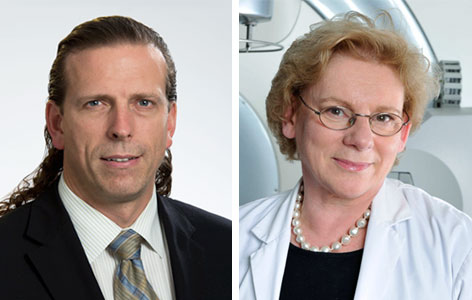Home page Description:
International Commission reveals lack of access to radiotherapy in low-income countries.
Posted On: October 19, 2015

Image Caption:
(L – R) UHN’s Drs. David Jaffray and Mary Gospodarowicz are leading the Lancet Oncology's Radiotherapy Commission.
According to the World Health Organization, 70% of the world’s cancer-related deaths occur in Africa, Asia and Central and South America. A recent article published in The Lancet Oncology reveals that as many as 90% of the world’s low income populations in these regions lack adequate access to the radiotherapy services required to treat cancer.
The data was compiled by a panel of international experts on The Lancet Oncology's Radiotherapy Commission, which is led by Dr. David Jaffray (Techna Director and UHN’s Executive Vice President Technology and Innovation), Dr. Mary Gospodarowicz (Medical Director, Princess Margaret Cancer Centre) and Dr. Rifat Atun (Professor of Global Health Systems at Harvard University).
The report predicts that by 2035, more than 12 million new cancer patients could benefit from radiotherapy treatment. Yet, worldwide access to radiotherapy is unacceptably low.
The building of radiotherapy capacity will require a large initial investment—however, the report states that the health and economic benefits of investments would be realized in just 10 to 15 years. "To justify the investment, we only need to look at the remarkable progress made in tackling the enormous challenges of HIV/AIDS and malaria," says Dr. Mary Gospodarowicz. "This gives us the hope and confidence that the same success can be achieved with cancer control and radiotherapy."
Atun R, Jaffray DA, Barton MB, Bray F, Baumann M, Vikram B, Hanna TP, Knaul FM, Lievens Y, Lui TY, Milosevic M, O'Sullivan B, Rodin DL, Rosenblatt E, Van Dyk J, Yap ML, Zubizarreta E, Gospodarowicz M. Expanding global access to radiotherapy. Lancet Oncol. 2015 Sep. [Pubmed abstract]
The data was compiled by a panel of international experts on The Lancet Oncology's Radiotherapy Commission, which is led by Dr. David Jaffray (Techna Director and UHN’s Executive Vice President Technology and Innovation), Dr. Mary Gospodarowicz (Medical Director, Princess Margaret Cancer Centre) and Dr. Rifat Atun (Professor of Global Health Systems at Harvard University).
The report predicts that by 2035, more than 12 million new cancer patients could benefit from radiotherapy treatment. Yet, worldwide access to radiotherapy is unacceptably low.
The building of radiotherapy capacity will require a large initial investment—however, the report states that the health and economic benefits of investments would be realized in just 10 to 15 years. "To justify the investment, we only need to look at the remarkable progress made in tackling the enormous challenges of HIV/AIDS and malaria," says Dr. Mary Gospodarowicz. "This gives us the hope and confidence that the same success can be achieved with cancer control and radiotherapy."
Atun R, Jaffray DA, Barton MB, Bray F, Baumann M, Vikram B, Hanna TP, Knaul FM, Lievens Y, Lui TY, Milosevic M, O'Sullivan B, Rodin DL, Rosenblatt E, Van Dyk J, Yap ML, Zubizarreta E, Gospodarowicz M. Expanding global access to radiotherapy. Lancet Oncol. 2015 Sep. [Pubmed abstract]




